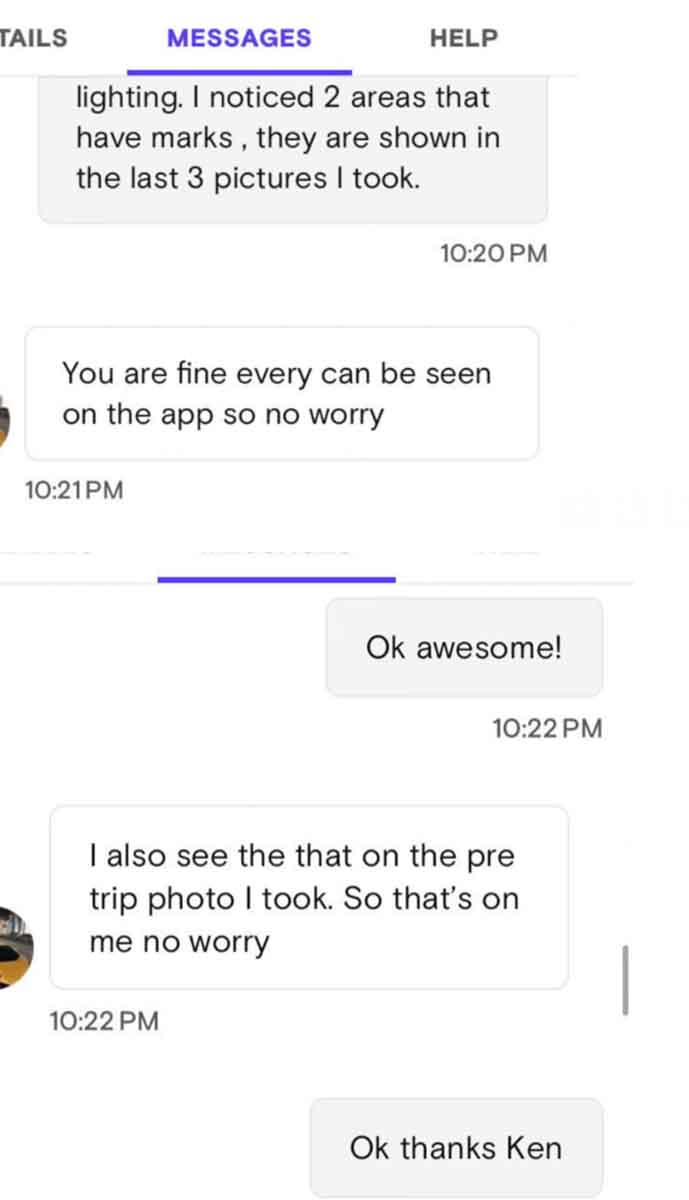Published: Updated:
Fraudulent repair bills aren’t just sent to customers of traditional rental car companies. Heidi Schiller found this out recently after a 24-hour car-sharing experience with Turo. Her vehicle host, Ken, acknowledged multiple pre-existing scratches on his Tesla before Heidi took the wheel.
Ken assured his renter that the damage to the car wasn’t her problem to worry about. So Heidi didn’t worry. That is until a few days later when Turo sent her a $640 repair bill for the vehicle.
After spending weeks attempting to convince Turo the repair bill was fraudulent, the company went silent. Heidi hoped someone had finally realized Ken was pulling a scam on her, charging her for damage someone else caused.
That turned out not to be the case.
Instead, Turo sent the $640 repair bill to collections, and Heidi turned to Consumer Rescue. With her credit and renting privileges on the line, she hoped our advocacy team could help. Her goal was not only to get out of collections, but to stop Ken from pulling the same scheme on others.
So what does the evidence show? Is Ken a predatory vehicle host or was Turo correct to bill Heidi for the damage to his vehicle?
Let’s find out.

Car-sharing a beat-up Tesla for 24 hours
Heidi’s car-sharing fiasco began last August when she selected Ken’s 2022 Tesla on the Turo app for a short rental. For those unfamiliar with Turo, it’s a peer-to-peer car-sharing company. Members can offer their personal vehicles for rent to others via the platform. Because of its similar business model, Turo is often referred to as the Airbnb of car rentals.
Heidi says the car looked sharp and seemed in good shape on the listing. But when she arrived at the location to pick it up, she noticed a variety of scratches and dents.
“I know it’s important to document the condition of any rental vehicle, so I took a handful of photos,” Heidi told me. “Then I sent a message to the host through the Turo app. He confirmed that he was aware of the scratches.”

Heidi was a bit uneasy about driving away with the damaged Tesla, but the host’s response was reassuring. She drove away and went about her business. Following the host’s instructions, she returned the car to the place he requested and at the scheduled time.
Heidi took photos of the vehicle again and assumed that concluded her dealings with Ken.
It did not.
Turo: Your host wants you to pay this car repair bill
Two days later, much to Heidi’s shock, she received a message from Turo informing her that the host wanted her to pay to repair scratches on the car.
Since Ken had confirmed in the Turo message center that his car was already damaged, Heidi assumed the company would quickly kick his complaint to the curb.
But that isn’t what happened.
Perhaps because of AI-generated customer service, Turo rejected Heid’s request to dismiss the host’s fraudulent damage claim. When she appealed the decision, Heidi pointed out that she had photos of the car’s damage before the rental began. A Turo agent only reconfirmed her responsibility to pay the repair bill, noting that her pictures weren’t clear and didn’t depict damage.
The next time Heidi heard from Turo, a representative gave her an ultimatum: pay the bill or else. She didn’t know what the “or else” was, but she quickly found out when she blocked Turo from charging her credit card and refused to pay the fraudulent car repair bill.
Related: Hertz says I caused over $6,000 in damage to my rental car. Can I just ignore this bill?
Asking Consumer Rescue to join this battle
When Turo went quiet, Heidi thought she had won this battle. But then she discovered Turo had sent the $640 repair bill to collections.
“Turo is putting my credit rating at risk,” Heidi told me. “Please help me fix this problem. I did not damage that vehicle. The facts show the owner knew it had tons of scratches when I drove away with it. This is crazy! Now I’m in collections.”
I went through Heidi’s paper trail and agreed with Turo on one point: Her photos were dark and didn’t make a compelling case. However, Ken’s own words did.
“You are fine,” he told Heidi when she pointed out the scratches. “Every[thing] can be seen on the app, so no worry.”
It was time to ask Turo’s executive team why it was allowing Ken to bill Heidi for pre-existing damage to his car.
Asking Turo to review this case
Hi Turo friends!
Heidi says she rented a Tesla via Turo for 24 hours. The car had not insignificant dents and scratches on it when she picked it up. The owner acknowledged the pre-existing damage and told her in a text “that’s on me.”
After she returned the car, the owner claimed she caused a deep scratch on the car that he didn’t believe was there before. The pictures he sent are blurry, and it’s unclear how that scratch was different from all the others and why he’s decided your customer should pay to repair this scratch when the car has multiple scratches and dents.
The end result is that despite denying causing any damage to the car, Heidi was billed $640 to repair it. Because she refused to pay it, Turo sent the bill to collections.
Would your team be able to take a look at this case and the photos the Tesla owner provided? Heidi says she is certain she did not cause any damage to that car.
Thank you! 😃🚗
📬 Subscribe to:
Tales from Consumer Advocacy Land
Real stories. Real rescues. Real advice.
Join thousands of smart travelers and savvy consumers who already subscribe to Tales from Consumer Advocacy Land — the friendly weekly newsletter from Michelle Couch-Friedman, founder of Consumer Rescue. It's filled with helpful consumer guidance, insider tips, and links to all of our latest articles.

Michelle Couch-Friedman, Consumer advocate
Good news from Turo
Very quickly, Turo sent good news: Heidi was not responsible for that fraudulent car rental repair bill.
Hi Michelle,
Our team has conducted a full review, and we are reimbursing the guest and doing everything possible to make matters right with her. We are also conducting further investigation and restricting [Ken] from our platform. We’re very sorry that this trip fell extremely short of the high expectations we have for our car sharing community.
Thanks again for bringing this to our attention and helping us make things right.
Turo Spokesperson
Heidi is thrilled by the outcome. She’s not sure if she will ever use a car-sharing service again. But if she does, she now knows how to protect herself: become a better pre- and post-rental photographer!
What to know about Turo before you use the car-sharing service
Unfortunately, many consumers jump right into using car-sharing companies like Turo without fully understanding the service. That oversight can put both the owner of the vehicle and the driver at risk for unexpected problems. Here are some things to keep in mind before using a car-sharing service.
1. Make sure you have car insurance
Before you consider hopping behind the wheel of any rental car via any platform, it is crucial that you make absolutely certain that you have insurance that will cover you. Specifically, you need Comprehensive Damage Waiver (CDW) and protection that will cover you if you injure someone or their property. You should not rely on your own car insurance without double-checking if your coverage extends to a car-sharing situation.
Note: Most insurance included with credit card memberships will not cover your rental if it is via a car-sharing platform. Never assume you’re protected. If you do, that could be a very expensive mistake should you become involved in an accident.
Related: My car rental company billed me $5,847 for damage! Why won’t my insurance cover this?
2. Read car host reviews on Turo
Turo is not a car rental company. It’s often called the Airbnb of car rentals because it provides a similar service — but to consumers looking to rent a vehicle. Both companies are listing sites that do not vet the users in a comprehensive way.
That means you as the driver should carefully select the car you’ll rent based not only on the type of vehicle you’re looking for, but on the host’s reputation on the platform. In the same way that you should review Airbnb hosts before booking a vacation rental, make certain to do the same before booking a car on Turo. The fact remains that there are bad actors on every platform and you need to do your best to steer clear of them.
3. Take clear photos and videos of the inside and outside of the vehicle
Because Turo is a peer-to-peer car sharing service you may be picking up the vehicle at someone’s home, on the street or maybe the owner will bring it to you. But wherever the exchange is made, it is crucial that it be in a well-lit area where you can carefully inspect the vehicle. Make sure to take clear photos of the car from all angles, both inside and out, before driving away. When you return it, do the same type of photo shoot.
Note: Recently Consumer Rescue has received complaints from car rental customers who’ve been surprised with under-the-hood and undercarriage damage. I recommend that you include these areas in your inspection – including the roof – places that you might not ever look, but that can have pre-existing damage.
Use Consumer Rescue’s free downloadable pre- and post-car rental inspection checklist to document all angles to protect yourself.
4. Pre-empt problems and report damage to Turo
If the photos of a vehicle on the site look pristine, but the car looks beat up in reality, report the problem to the host via the Turo messaging center. You want to make sure that you officially document the deviation and that Turo has access to those messages. In most cases, taking photos of the vehicle and reporting it to the host and company, will protect you from fraudulent damage charges. But…
5. Ask Consumer Rescue for free advocacy assistance
If, despite your best effort to vet your car host, you get hit with repair charges or other fees that you shouldn’t owe, send your request for help to Consumer Rescue. We rescue consumers every day. Our advocacy is fast, friendly, and best of all, free. (Michelle Couch-Friedman, Founder of Consumer Rescue)

Before you go: How did Ace Rent a Car create a damage report for a customer… 2 days before her rental?



